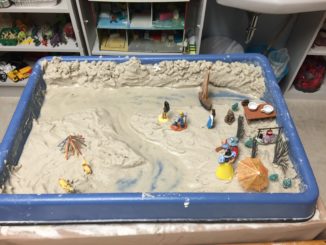
When spiritual teachers say that things are an “illusion,” what does that really mean? Hunger is an illusion, but we can certainly still experience it or die from it. How does that help?
First off, pretend you’re driving a car. The car you have is a tool. The tool is not you, but it still needs to be filled with gas and taken care of to run effectively. Don’t give it any gas and it’ll stop working.
The car, however, is not you. It is clear that you are the driver of the car, not the car itself.
The “illusion” would be that the car is you and that if the car dies, you die.
People have a tendency to believe that their bodies are them and if the body dies, they die. We can see this reflected in the way we language things such as, “I’m don’t feel good” when they have a stomach ache. The stomach you have may hurt, but the stomach is not you. The language is reflecting the illusion.
The first error is a case of mistaken identity.
The first illusion is that the car is you. Seeing through the illusion gives you the realization that the car is not you.
By recognizing that the car is not you, that doesn’t mean that you should stop taking care of the car. Similarly, by recognizing that the body is not you, that doesn’t imply that you should suddenly stop taking care of the body.
With respect to hunger, certainly hunger is a very experiencable reality for all of us. There are stories of yogis in India who, though their connection to Source, get all the energy they need and therefore don’t need to eat food. There’s also stories of people who are able to look into the sun and, almost like plants, get the energy they need that way. I don’t know how much of this is true, but it’s interesting food for thought… no pun intended.
Interesting stories aside, with the realization that the body is not us, instead of saying “I am hungry,” we could then change our language to reflect the disassociation and now say that “The body is hungry.” It may sound weird because most people don’t talk that way, but it’s more accurate.
Now, even if we make the distinction between “I am hungry” and “The body is hungry,” that doesn’t actually change the fact that the body is hungry, nor is it actually intended to.
What happens is that this begins the unraveling of the sense of a personal self. When one says “The body is hungry, but I’m not,” it certainly strikes them as odd. “I’m not hungry? I’m obviously experiencing hunger and it feels very real. Who is it that’s experiencing this sense of hunger?”
Then one begins to ask the dynamite question, “Who/What am I?”
One’s level of consciousness begins to increase until they begin to have “spiritual experiences” in which they have a brief taste of the Divine, total and complete Oneness with the infinite nothingness. However, as Tom Stine aptly points out, an encounter with the Absolute is not yet Enlightenment. It’s more like a taste of things to come, a sign that you’re on the right track. Gradually the experiences become more and more common until they become more common than the sense of individualized separation and then ultimately the presence of the Absolute becomes permanent.
From this state of Oneness with the Divine and only from this state can one truly look at the material world of form and recognize its complete illusory nature. All that changes, all that exists in the world of form is illusion.
The second error is the belief that what we experience must be actually real.
That which changes is unreal.
That which is unchanging is Real.
Yes the illusion can be experienced, just like we can observe and feel our own reactions to what we see on TV, the illusion is still recognized to be illusion.
It’s like seeing sand castles everywhere and thinking that they’re actually castles. The castles are simply structures that sand is temporarily taking the shape of. The fundamental units, the grains of sand are real, but there is no castle that’s ACTUALLY there, despite the ability for people to see “castle.” The concept of “castle” only exists in people’s minds.
With hunger, it’s the same exact thing. Have you noticed that by turning your attention to something which you become deeply involved in, you can keep going on and on for hours without getting hungry? Apparently our minds have something to do with hunger and our bodies, which respond to our minds, react accordingly. There’s certainly more to it than that which we can recognize by the fact that babies can get hungry. Hunger is an instinctual capacity of the body, even if it can be overridden by the mind.
Despite our ability to feel hunger and interact with it, it is ultimately no more real than the experiences we have at night when we dream. That is, it’s “all in our minds” (and our bodies, but neither are ultimately Real).
There is no one there actually experiencing the hunger. There is simply hunger being experienced. There is an imaginary body experiencing imaginary hunger.
The whole concept of change depends upon the illusion of time. That is, it takes time to go from stage A to stage B. In the nondualistic realm, everything exists all at once, Now. That which is linear and dualistic is unreal. That which is non-linear and non-dualistic is real.
The third error is not seeing the Divine in All That Is.
Finally when one no longer identifies with this and NOT that, ie. “I am me, but I am not you,” and truly becomes Oneness, everything which is “unreal” is recognized as being an aspect of Divinity.
God is the Alpha and the Omega, the Unmoved Mover, the Unchanging Change, the Full Emptiness, the Flowing Stillness. God is the essence of the paradox.
Everything in the Universe is God, including the ego which allows us to experience separation from God in our sandbox we call earth. In the sandbox we get to pretend that we’re separated from God which is really ironic considering we ARE God.
Ultimately every aspect of Oneness is recognized as God, INCLUDING every body, every mind, every thought, every fear, every action, every creation, every destruction.
God is All That Is and there is no opposite to God, no such thing as non-God.
A little boy dressed up for Halloween as a vampire can experience being a vampire, even if he temporarily forgets he is a little boy. We are all Gods experiencing what we call human existence, but we’re all still Gods even if we temporarily have forgotten this is so.
Now, this statements comes with a disclaimer. Don’t use this to try and rationalize the validity of the ego. “Hey, if everything’s a part of God and the ego is a part of God, then the ego is alright and I don’t have to bother transcending it. Yippee!!”
No, don’t make that mistake. This identification with Allness must happen AFTER when realizations that they are not a separate being, disconnected from the whole. It is the ego who makes this separation possible in the first place.
Yes the ego is ultimately a part of God, just like all else, but it is involved with creating a sense of separation from Allness (which is actually impossible) and thus creates an experience which is not real.
To summarize, illusion can be recognized by the following attributes:
* A feeling of separation from God
* Thoughts and beliefs that spring from separation from God
* Beliefs based in duality which state that there are two diametric opposites
* Something which changes
* Any feeling other than the presence of Divine Love
* Our physical reality including time and space (distance)
Finally, one key point to recognize is that recognizing Oneness does not need to stop bodily functions such as eating, drinking, or being in the world.
As the saying goes, “Before enlightenment, chop wood and carry water. After enlightenment, chop wood and carry water.”
It is possible to recognize illusion as illusion and still interact with it, to pretend that it’s real and play with it without actually believing it’s real.
Proudly WWW.PONIREVO.COM
by Ariel Bravy



